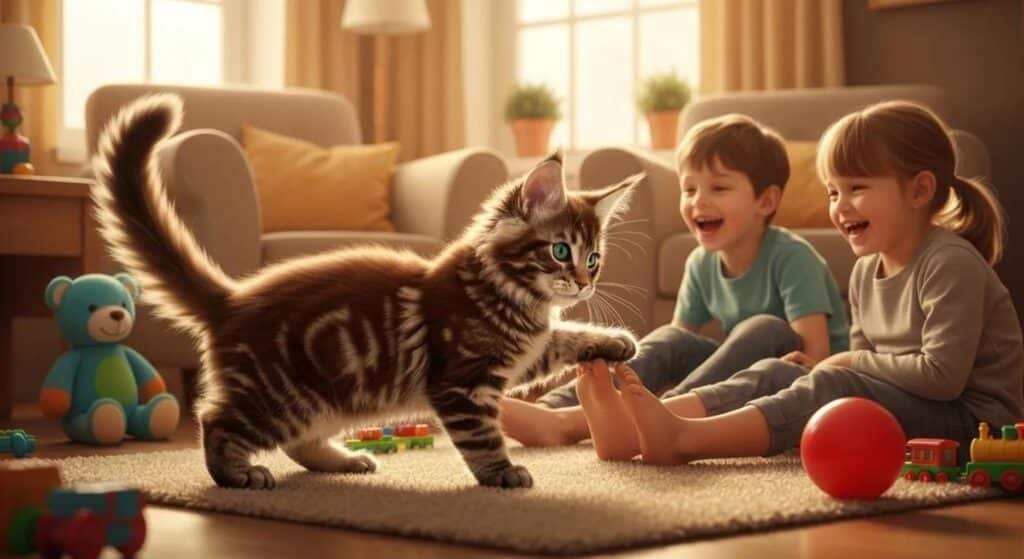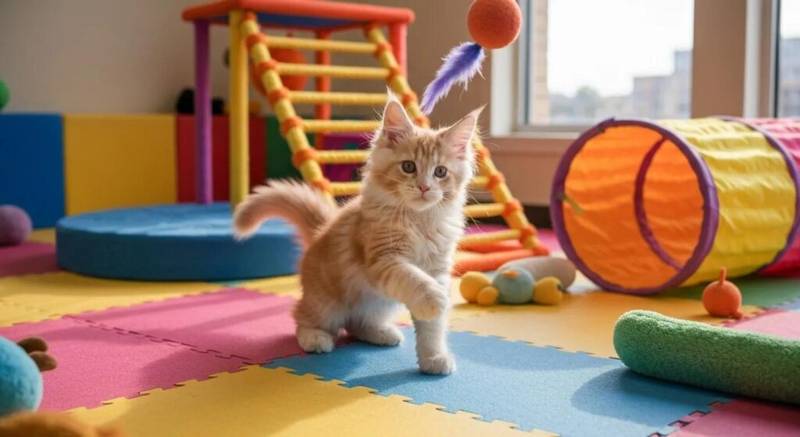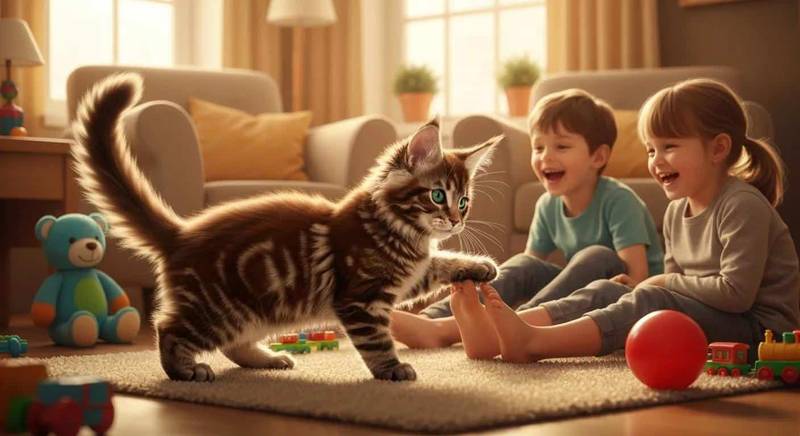
What Do Owners Reveal About the Health and Temperament of Maine Coon Kittens?
Maine Coon kittens often capture hearts with their gentle giant reputation, but owners want more than charm—they seek assurance of robust health and a loving temperament. In this guide, we reveal what real families report about common genetic conditions, personality traits, socialization benefits, breeder standards, customer testimonials, Bellspurr’s protocols, and breed comparisons. You’ll discover how responsible breeding and early handling shape a confident, playful companion, why Bellspurr’s TICA-registered lines deliver a health guarantee, and where to find your ideal kitten. Whether you’re researching “what do previous customers say about the health and temperament of Maine Coon kittens” or ready to adopt, this article maps every insight you need for a seamless, informed journey.
What Are the Most Common Health Issues in Maine Coon Kittens?

Maine Coon kittens can inherit specific genetic conditions that affect cardiac, skeletal, and neurological health, so understanding these risks helps owners manage lifelong wellness.
Which Genetic Conditions Affect Maine Coon Kittens?
Genetic screening identifies inherited diseases such as Hypertrophic Cardiomyopathy (HCM), Spinal Muscular Atrophy (SMA), and Hip Dysplasia to prevent breeding carriers. Responsible breeders use DNA tests to detect gene variants before pairing adults, ensuring kittens arrive free of high-risk mutations. Early detection supports targeted veterinary care and minimizes long-term treatment costs while fostering confidence in a healthy start.
Genetic Screening for Maine Coons
Genetic screening is crucial for identifying inherited diseases in Maine Coon kittens, such as Hypertrophic Cardiomyopathy (HCM), Spinal Muscular Atrophy (SMA), and Hip Dysplasia. This proactive approach helps breeders prevent the transmission of these conditions and allows for early intervention and management.
The Winn Feline Foundation
This research supports the article’s emphasis on responsible breeding practices and the importance of genetic testing to ensure the health of Maine Coon kittens.
How Does Hypertrophic Cardiomyopathy (HCM) Impact Maine Coons?
Hypertrophic Cardiomyopathy stiffens the heart muscle, reducing cardiac output and risking sudden heart failure in cats. Affected cats may show rapid breathing or lethargy by 6–12 months, and routine echocardiograms can catch thickened ventricular walls early. Proactive screening improves prognosis by enabling medication that maintains normal heart function and extends quality of life.
What Are the Symptoms and Risks of Hip Dysplasia in Maine Coons?
Hip Dysplasia occurs when the hip joint develops improperly, causing pain, reduced mobility, and arthritis. Signs include bunny-hopping gait, reluctance to jump, and intermittent lameness. Early radiographic evaluation and controlled exercise strengthen surrounding musculature, while weight management lessens joint stress and promotes comfort into adulthood. Maine Coon cats are known for their playful and affectionate nature.
How Are Spinal Muscular Atrophy (SMA) and Polycystic Kidney Disease (PKD) Diagnosed?
DNA analysis confirms SMA by detecting specific gene mutations in kittens. Genetic panels reveal SMA carriers at birth, guiding breeder decisions that eliminate the defective allele from the gene pool. Polycystic Kidney Disease (PKD) is not commonly reported in Maine Coons but is more prevalent in Persian-related breeds; therefore, routine PKD screening is not standard for Maine Coons. Ultrasound screening is used for PKD detection in susceptible breeds.
What Preventative Measures Do Responsible Breeders Take for Health?
Top breeders implement multi-generation genetic testing, veterinary health certificates, and regular wellness checks to ensure strong kitten health. They source adult cats with three-generation TICA pedigrees and require negative results for HCM, SMA, and hip evaluations. These protocols foster healthier litters and build trust that kittens arrive ready for lifelong care.
How Do Owners Describe the Temperament and Personality of Maine Coon Kittens?
Owners consistently praise Maine Coon kittens for their affectionate loyalty, high intelligence, playful energy, and clear vocal communication, making them ideal family pets. Maine Coon cats are known for their unique traits and loving nature. Maine Coon cat breed history provides insight into their characteristics and care.
What Are the Key Personality Traits of Maine Coon Kittens?
Maine Coon kittens combine surprising gentleness with dog-like devotion, so families enjoy an interactive companion that follows them room to room. They learn simple commands like “come” and relish fetch games, showcasing their intelligence. Their even temperament adapts to new environments, fostering calm interactions with children and elderly relatives. Maine Coon cats are known for their playful nature and strong bonds with their families.
Common Traits Reported by Owners
- Playfulness: They initiate interactive games multiple times per day.
- Loyalty: They seek human companionship and often nap beside their favorite person.
- Intelligence: They quickly master puzzle feeders and treat-dispensing toys.
These traits prepare the ground for understanding their vocal nature and social adaptability.
How Do Maine Coons Communicate Through Vocalizations?
Maine Coons use chirps, trills, and soft meows to express curiosity, hunger, or greeting, creating a vivid dialogue with their families. Owners note that kittens trill when they want attention and chirp at birds, reflecting keen intelligence and a desire to share experiences. This vocal repertoire strengthens the human–cat bond by providing clear cues for interaction.
How Adaptable Are Maine Coons with Children and Other Pets?
Maine Coon kittens demonstrate remarkable social flexibility, often welcoming toddlers and resident dogs with gentle curiosity. Early supervised play sessions build trust, and kittens learn to modulate play intensity around smaller animals. This adaptability helps multi-pet households integrate happily and avoids territorial conflicts.
What Owner Experiences Highlight Maine Coon Affection and Playfulness?
Families frequently share anecdotes of kittens initiating snuggles on command or dragging toys to remote corners of the home. One owner recalls a kitten trilling at the front door to signal playtime, then purring through a gentle head-butt. These moments underscore how affectionate behaviors emerge naturally when kittens receive consistent social engagement.
Why Is Early Socialization Critical for Maine Coon Kitten Development?

Early socialization between weeks three and nine builds a foundation for confident exploration, resilience, and positive interactions throughout life.
What Is the Critical Socialization Window for Maine Coon Kittens?
The socialization window from 3–9 weeks of age exposes kittens to human handling, new sounds, and varied surfaces to prevent future fear responses. During this phase, gentle handling sessions lasting five minutes, three times daily, teach kittens to associate human touch with comfort. Adequate exposure reduces anxiety and encourages curiosity in later life.
Early Socialization Benefits
Early socialization, particularly between 3 and 9 weeks of age, is vital for Maine Coon kittens. During this period, exposure to human handling, various sounds, and different environments helps kittens develop into confident and well-adjusted adults, reducing the likelihood of fear-based behaviors.
American Animal Hospital Association (AAHA)
This citation reinforces the article’s discussion on the critical socialization window and its impact on a kitten’s temperament and adaptability.
How Does Handling and Human Interaction Shape Kitten Behavior?
Regular, calm handling trains kittens to accept grooming, veterinary exams, and travel without stress. Holding kittens in different positions, brushing their fur daily, and touching their paws for a few seconds strengthens trust. These routines result in cats that remain composed during nail trims or vet visits, enhancing overall well-being.
What Role Does Exposure to Sounds and Environments Play?
Kittens introduced to household noises—vacuum cleaners, doorbells, music—develop resilience to everyday stimuli and avoid noise-triggered anxiety. Gradual audio sessions, starting at low volume, acclimate kittens to varied decibels. This approach fosters relaxed responses and prevents startle-based stress that could complicate adult behavior.
How Does Interaction with Other Animals Influence Temperament?
Supervised play with vaccinated adult cats and calm dogs teaches kittens appropriate social cues, reducing aggression and fostering empathy. Short, positive encounters with other species broaden kittens’ social repertoire and encourage polite interactions. Kittens learn to read body language cues, minimizing future conflicts and supporting harmonious multi-pet homes.
What Are the Benefits of Playtime and Enrichment Activities?
Structured play sessions with puzzle toys, tunnels, and climbing towers enhance cognitive development and prevent boredom-related mischief. Daily enrichment strengthens problem-solving skills and maintains a healthy weight through active exercise. Engaged kittens grow into well-balanced adults who channel curiosity into safe outlets.
How Can You Identify a Reputable Maine Coon Breeder Focused on Health and Temperament?
Selecting a breeder with recognized certifications, transparent health protocols, and ongoing support ensures you adopt a healthy, well-adjusted kitten.
What Certifications and Registrations Should a Responsible Breeder Have?
Reputable breeders register with TICA or CFA and hold cattery recognition that verifies adherence to breed standards and ethical practices. A TICA-registered cattery listing (e.g., Bellspurr on TICA) confirms three-generation pedigrees and health testing policies, demonstrating credibility and accountability.
How Do Health Guarantees and Genetic Testing Reflect Breeder Transparency?
Transparent breeders provide written health guarantees and detailed genetic test reports for every kitten. They supply certificates confirming negative HCM and SMA results, illustrating commitment to purity and wellness. This clarity empowers buyers to make informed decisions and mitigates future medical surprises.
Why Are Cattery Visits and Environment Important for Kitten Well-being?
On-site visits allow prospective owners to observe living conditions, socialization routines, and adult cat temperaments. Clean, spacious environments with varied play stations encourage natural development. Visiting the cattery reveals how kittens interact with caregivers, offering direct insight into early handling quality.
What Post-Adoption Support Should You Expect from a Breeder?
Highly regarded breeders provide guidance on nutrition, litter training, and behavior for at least a year post-adoption. They remain available for virtual meetings or in-person consultations, ensuring challenges like teething or scratching are addressed proactively. Ongoing support cements trust and promotes successful transitions.
What Do Previous Customers Say About the Health and Temperament of Their Maine Coon Kittens?
Customers consistently report that their Bellspurr kittens maintain excellent health milestones and display gentle, sociable personalities from the first day home.
How Do Owners Report on Their Kittens’ Health After Adoption?
Owners describe robust appetites, healthy weight gain, and clear veterinary check-ups at 8 and 12 weeks. One family noted zero digestive issues after transitioning from mother’s milk, attributing smooth progress to the breeder’s nutritional guidance. These accounts highlight the value of pre-adoption wellness protocols.
What Temperament Traits Do Owners Commonly Praise?
Families praise kittens for their curiosity, calm demeanor around visitors, and quick adaptation to new routines. Testimonials mention kittens curling up on laps after playtime, demonstrating affectionate trust that stems from early socialization. Such feedback reinforces the importance of structured handling before adoption.
How Do Customers Describe the Purchase and Delivery Experience?
Buyers commend a transparent application process, timely updates, and personalized delivery, ensuring kittens arrive relaxed and ready to explore their new home. Bellspurr coordinates virtual meet-and-greets and custom travel crates, reducing stress on kittens. This seamless service inspires confidence and minimizes relocation anxiety.
How Does Bellspurr Ensure Healthy, Well-Tempered Maine Coon Kittens?
Bellspurr combines rigorous genetic screening, in-home socialization, guaranteed health policies, and white-glove delivery to produce confident, loving companions.
What Genetic Testing Protocols Does Bellspurr Follow?
Bellspurr tests breeding cats for HCM, SMA, and hip conformation, then shares full results with adoptive families. This multi-gene panel approach prevents propagation of harmful alleles and aligns with best practices recommended by veterinary specialists. Maine Coon cat breed history
How Does Bellspurr’s Socialization Program Enhance Kitten Temperament?
Bellspurr’s program introduces each kitten to daily handling, diverse surfaces, household noises, and supervised pet interactions from weeks 3–9. Early enrichment activities—fetch training, gentle grooming, environmental exploration—cultivate adaptable, curious kittens ready for family life.
What Health Guarantees and Support Does Bellspurr Offer?
Every kitten comes with a one-year genetic health replacement guarantee and lifetime breeder support for medical questions. Bellspurr provides vet referrals, nutritional advice, and check-in calls, reinforcing trust and ensuring your kitten’s continued well-being.
How Does Bellspurr’s Purchase and Delivery Process Support Buyers?
Bellspurr streamlines adoption with a clear online application, flexible payment plans, and custom delivery crates that maintain comfort throughout transit. Adoptive families receive daily travel updates and a starter kit of premium food and toys available at the Bellspurr Amazon shop. This meticulous approach reduces stress and fosters a joyful first day.
How Do Maine Coon Kittens Compare to Other Breeds in Health and Temperament?
Comparing Maine Coons to British Shorthairs reveals distinct predispositions and behavioral nuances, guiding prospective owners toward the best breed fit.
Before diving into specifics, the following table outlines key health and temperament differences:
| Attribute | Maine Coon | British Shorthair |
|---|---|---|
| Cardiac Risk | Higher HCM prevalence | Lower genetic HCM incidence |
| Joint Health | Moderate hip dysplasia predisposition | Less frequent hip issues |
| Social Needs | Highly social and interactive | More independent and reserved |
| Vocalization | Chirps and trills | Soft, infrequent meows |
| Energy Level | Energetic and playful | Calm and moderately active |
What Are the Health Differences Between Maine Coons and British Shorthairs?
Maine Coons exhibit a higher risk for HCM and hip dysplasia, so breeders emphasize cardiac ultrasounds and orthopedic screenings. British Shorthairs face fewer genetic conditions but may develop obesity-related issues without proper exercise. Understanding these predispositions ensures tailored veterinary care.
How Do Temperament Traits Differ Between These Breeds?
Maine Coon kittens seek constant engagement and express themselves with varied vocalizations, while British Shorthairs prefer quiet companionship and minimal lap time. Families desiring an interactive playmate benefit from a Maine Coon, whereas those seeking a low-maintenance pet often choose a British Shorthair instead.
What Grooming and Care Needs Vary Between Maine Coons and Other Breeds?
Maine Coons require weekly brushing to manage their flowing coat and reduce hairballs, whereas shorter-haired breeds need monthly maintenance. Maine Coon nails grow more rapidly due to frequent climbing and play, so regular trims prevent snagged fur and furniture damage. Proper grooming routines foster comfort and strengthen human–pet bonds. For more information on this breed, visit Maine Coons.
Maine Coon kittens deliver a blend of robust health screening, affectionate social traits, and engaging energy that sets them apart among pedigreed cats. Bellspurr’s proven protocols—from TICA registration (official cattery page) to white-glove delivery—ensure each kitten thrives in loving homes. By understanding owner feedback and breeder standards, you can adopt confidently, knowing your new companion brings both vitality and devotion into your family.
Explore our healthy, well-tempered Maine Coon kittens today at Bellspurr Maine Coon kittens for sale or meet our playful litters in action on our YouTube channel.Explore finding Maine Coon kittens

